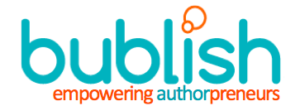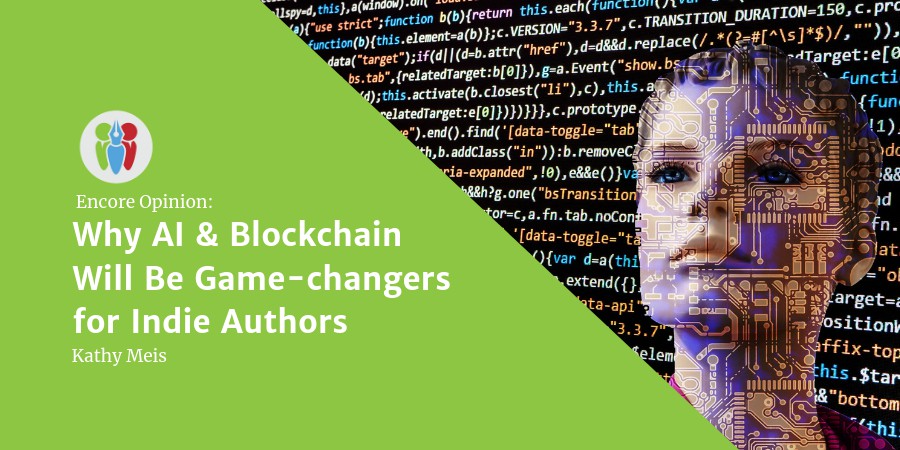Encore month continues with a post on technological advancements. Technology is changing at rocket speed. Some of you might find the prospect frightening, others might revel in it. What's clear is that there will be plenty of opportunities to use technology if you want to capitalize on them. Partner member Kathy Meis, CEO of Bublish, presents her vision of artificial intelligence and blockchain as a real game-changer for indie authors.

Kathy Meis, CEO of Bublish, anticipates indie authors will gain huge benefits from AI and blockchain
I have been a professional writer and editor most of my life, only recently entering the world of technology as the founder of Bublish, a complete publishing platform with built-in marketing.
For me, technology seems a natural fit for marketing books in the digital age.
Manuscript development, book positioning and design, however, still require human expertise, which is why my team still performs these services the old-fashioned way, by putting in the man hours.
The Essential Human Elements
Though development and positioning tasks can be time-consuming and expensive, they establish an important professional foundation for a book:
- When a book’s foundation is solid, it has a chance to rise to the top of its category, and marketing efforts typically deliver a strong return.
- Conversely, if a book’s foundation is weak, all the marketing dollars in the world won’t sell many copies.
We see this correlation in action every day: the more capable an indie author is of publishing a book that will delight a well-defined audience, the better their sales.
Yet, the reality is, many indie authors have never thought about positioning their book as an information or entertainment product in a competitive marketplace. After all, you are writers, not publishers. Most of you don’t start your publishing journey by researching competitive titles, reader expectations or audience demographics.
Truth is, you make the most important, foundational decisions about your book without any information about the marketplace into which you are about to publish. The result? Even indie books with great potential get lost in a sea of content—and with 70,000 titles published each month, the competition for reader attention has never been stiffer.
This poses a nagging problem for me as an entrepreneur: since this important foundational work still requires many hours of human expertise, how can my team help more independent authors like you publish more marketable books, get them in front of the right audience and market them effectively?
That’s where Artificial Intelligence (AI) comes in.
Enter Artificial Intelligence
Artificial Intelligence makes it possible for computers to perform tasks that normally require human time and intelligence.
With some basic book information provided by you as the author, we can now program computers to find and interpret crucial marketplace data and audience information.
Imagine starting your publishing journey with a report that could give you:
- A description of your genre’s audience
- The best categories for your book
- Popular page counts, prices, formats and trim size for books in your category
- Guidance on how to write your synopsis
- A list of books your target readers are currently purchasing so you can study them
- Keywords readers are using to search for books like yours
- Color, font, and cover-image trends in your genre
- The best time to launch your book
- The bloggers and influencers you should contact about your book
- Popular narrative structures for books in your category
- Information to optimize your product pages at major online bookstores
And more… the possibilities are endless.
Imagine a guided publishing process that could provide this type of crucial marketplace information throughout your journey as an indie author:
- It would take the guesswork out of publishing a marketable book
- It would give you a competitive edge in today’s crowded book marketplace
Wouldn’t this type of information greatly improve your chances for publishing success? That’s what Artificial Intelligence can do for indie authors.
Different Benefits through Blockchain
Blockchain technology offers different benefits to indie authors.]
At its essence, blockchain provides a global, incorruptible digital ledger that can continuously record transactions around almost anything of value, like your book.
We see many applications for blockchain in publishing, but our primary focus right now is:
- Verifiable copyright protection to curtail piracy of indie-published books
- The sale of book rights with instant payments through smart contracts
Piracy is a big issue for indie authors, and blockchain could put an end to it. Because of the decentralized nature of blockchain ledgers, it’s virtually impossible to hack them. In essence, this ledger could be built right into your ebook, verifying that a reader has the necessary permission to read your book when they try to open it, and denying access if they don’t.
Selling foreign and other book rights is another opportunity that blockchain could open up for indie authors. Most indies don’t have the network to reach foreign rights buyers in different countries. Nor do they have the expertise to negotiate the terms of those rights sales, the legal savvy to draw up contracts for the sale, or the systems to make sure they get paid their advance and royalties after the sale has taken place. Blockchain technology could cut out the middlemen involved in these complex transactions, automate contracts and payments, and make selling book rights much easier for indie authors. This could offer a lucrative new channel for indie authors to monetize books they’ve already published.
Free Webinar about AI & Blockchain (February 13)
At Bublish, we envision artificial intelligence and blockchain technology changing the game for indie authors.
 We’re having a webinar this Wednesday, February 13, to further show you what’s possible and what we’re working on at Bublish. Our AI and blockchain gurus will be on hand to explain the technology and answer your questions.
We’re having a webinar this Wednesday, February 13, to further show you what’s possible and what we’re working on at Bublish. Our AI and blockchain gurus will be on hand to explain the technology and answer your questions.
If you’re interested in seeing what the future of indie publishing looks like, we hope you’ll join us and spread the word to other authors who might be interested.
(Can't make the event live? No problem – just register anyway to access a free video after the event.)
#Indieauthors - what can #AI & #Blockchain do for you? Kathy Meis of @BublishMe says they'll be a gamechanger - and invites you to join their free webinar on the subject this Wed 13 Feb Share on XOTHER POSTS ABOUT AI & BLOCKCHAIN
From the ALLi Author Advice Center Archive





In any information I have read on blockchain, the articles all say that this technology uses huge amounts of energy “from the grid.” I’m assuming the electric grid. I have not seen a single word on who and how that obstacle is going to be overcome. Is it just me or does that seem like an insurmountable problem.
Bitcoin (probably the most well known application of blockchain) uses a lot of electrical energy to create new bitcoins. Bitcoin and blockchain aren’t the same thing, although some articles are written as if they are, which doesn’t help understanding.
Not all blockchains use the same method of creating new tokens, however, so they aren’t all as power-hungry as Bitcoin. Ethereum, which is used by some publishing-related blockchain companies (Publica for example), is less power-hungry than Bitcoin. So presumably this won’t be an issue for all blockchains.
I don’t see any reason why blockchain will be any better at preventing piracy than traditional DRM. It may be impossible to hack blockchain ledgers, but it’s also impossible to hack DRM encryption.
The difficulty is key management. The end user has to be able to have the keys so that they can read the file. Current methods of circumventing DRM don’t rely on breaking the encryption, they get the keys so that the encrypted file can be decrypted normally. How does blockchain avoid that issue?